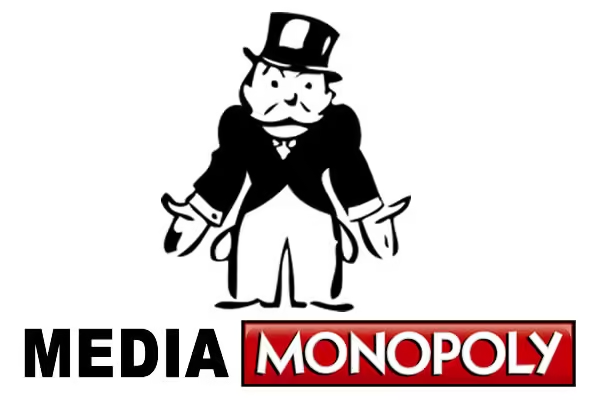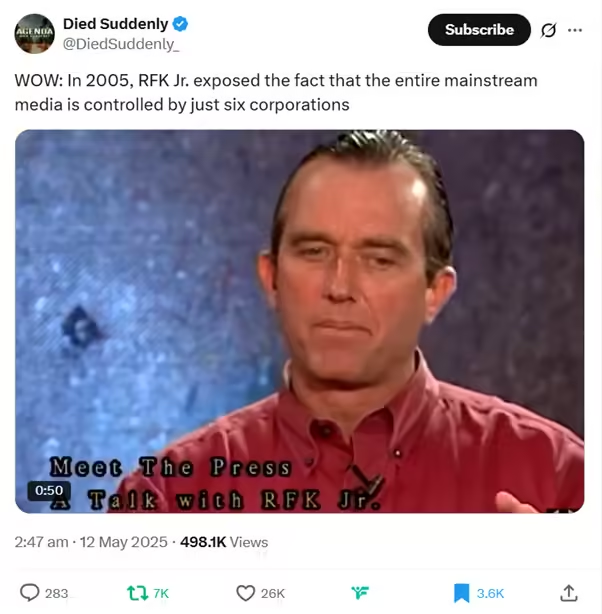Beyond Media Ownership to Distribution Cartels and Tech Monopolies
We are constantly bombarded with information. A relentless flow of news, opinions, and narratives that shape our understanding of the world. At first glance, the landscape of media outlets might appear diverse, a marketplace of competing voices vying for our attention. However, a closer examination reveals a far more concentrated reality. A media ownership monopoly where a handful of powerful corporations control a significant portion of what we read, watch, and hear. This concentration of ownership has long been a cause for concern. Raising questions about media bias, the suppression of dissenting voices, and the narrowing of perspectives.
But the story, as we are now compelled to explore further, is far more intricate than simply who owns the newspapers, television channels, and online platforms. The real levers of control extend beyond content creation to the very arteries through which information flows. The wholesale and distribution networks that deliver media to our doorsteps and devices. Furthermore, in the digital age, the dominance of tech giants like Google has emerged as another critical choke point. Shaping how we access and discover information online. Understanding these interconnected layers of control. From ownership to distribution cartels and tech monopolies – is crucial to grasping the true nature of the media landscape and its profound impact on our society.

The Traditional Media Ownership Monopoly: A Familiar Concern
The concentration of media ownership is a well-documented phenomenon. In many countries, including the UK, a small number of large corporations wield significant influence over the press, broadcast media, and increasingly, online news platforms. This consolidation has been driven by mergers, acquisitions, and the economic pressures of a rapidly changing media environment. The consequences of this concentrated ownership are manifold:
- Homogenization of Content: With fewer owners, there's a risk of a narrowing range of perspectives and a greater emphasis on stories that align with the owners' interests. Be they political, economic, or personal. Diverse voices and alternative viewpoints may struggle to find a platform.
- Reduced Journalistic Independence: Journalists may face pressure, subtle or overt, to conform to the editorial line set by the owners. Potentially compromising their ability to report independently and hold power to account.
- Prioritization of Profit over Public Interest: Media corporations, driven by the need to generate profits for their shareholders, may prioritize commercially viable content over in-depth investigative journalism or coverage of less popular but socially important issues.
- Barriers to Entry for New Voices: The sheer scale and established infrastructure of these media giants can make it incredibly difficult for smaller, independent media outlets to gain traction and reach a wider audience.
While the implications of this ownership monopoly are significant and warrant ongoing scrutiny. The feedback we've received compels us to look beyond this surface layer and examine the often-overlooked realm of media distribution.
The Unseen Cartel: Control Over the Flow of Information
The suggestion that the wholesale and distribution of media operate as a cartel, potentially dominated by a few key players, including the historical significance of W H Smith, opens up a critical new dimension to our understanding of media control. The physical distribution of newspapers and magazines, while perhaps seeming less relevant in the digital age, still plays a vital role for many, particularly for local news and a significant segment of the population.
Historically, W H Smith held a dominant position in news distribution in the UK. While their wholesale arm, Smiths News plc, demerged in 2006, it remains a major player in the sector. Investigating the current landscape of media wholesale and distribution reveals a highly concentrated market with a few key companies handling the logistics of getting publications from printing presses to newsstands and retailers.
The implications of such a concentrated distribution network are significant:
- Gatekeeping Power: A small number of distributors effectively act as gatekeepers, deciding which publications get prominent placement, wider distribution, or even make it to the shelves at all. This power can influence the visibility and success of different media outlets.
- Potential for Bias: There's a risk, whether intentional or unintentional, that distributors might favor publications from larger media groups or those that align with their own commercial interests, potentially marginalizing smaller or independent publications.
- Barriers to Entry for Publishers: New or smaller publishers might face significant hurdles in securing favorable distribution agreements, limiting their ability to reach a broad audience, regardless of the quality or importance of their content.
- Impact on Local Journalism: The economics of newspaper distribution can be challenging, particularly for local news outlets. Concentrated distribution networks might prioritize high-volume publications, potentially disadvantaging local papers with smaller print runs and tighter margins.
While the term "cartel" implies an active agreement to limit competition. Even a highly oligopolistic market structure in media distribution can lead to similar outcomes in terms of reduced diversity and limited access for alternative voices. Thorough research into the market share, operational practices, and historical influence of key distributors like Smiths News and others is crucial to understanding the extent of this potential control.

The Digital Realm: Google's Grip on Information Access
In the digital age, the way we access information has been fundamentally transformed. Search engines have become the primary gateway to online content. One company, Google, has achieved near-ubiquitous dominance in this crucial space. With a market share consistently around 90%, Google's search engine dictates what information is easily discoverable and what remains largely invisible to the vast majority of internet users.
Google's influence extends far beyond simply ranking search results. Its control over the digital advertising ecosystem further solidifies its power. The article from searchenginewatch.com highlights how Google's decision to phase out third-party cookies, while presented as a move towards greater user privacy, could inadvertently strengthen its own position. With its vast trove of first-party data gathered from its various services (Search, Gmail, YouTube, Maps, etc.), Google is uniquely positioned to target advertising effectively. Potentially disadvantaging smaller competitors who rely more heavily on third-party data.
The antitrust concerns surrounding Google, as evidenced by numerous lawsuits and investigations in the US, UK, and EU, underscore the potential for anti-competitive practices stemming from this dominance. Allegations include:
Favoring its own services
Critics argue that Google unfairly promotes its own products and services in search results, pushing down organic links to competitors.
Abuse of its advertising dominance
Concerns exist that Google leverages its control over both the supply and demand sides of the digital advertising market. This can stifle competition and inflate prices.
Creating barriers to entry
Google's vast scale and integrated ecosystem can make it incredibly difficult for new search engines or advertising platforms to gain a foothold.
The implications of Google's monopoly on information access are profound:
Shaping the Information Landscape
Google's algorithms, while designed to provide relevant results, inevitably shape the information we encounter. This can lead to filter bubbles and echo chambers, where users are primarily exposed to information that confirms their existing beliefs.
Impact on Media Visibility and Revenue
News organizations and other media outlets rely heavily on traffic from Google Search. Changes to Google's algorithms can have a significant impact on their visibility and, consequently, their advertising revenue. This dependence can create a power imbalance, where media outlets are beholden to Google's policies.
Censorship and Manipulation
While there's no "direct" evidence of a "deep state" manipulating Google's algorithms, the potential for powerful actors to influence the flow of information through such a dominant platform is a legitimate concern.
Limited Choice and Innovation
The lack of significant competition in the search market can stifle innovation and limit the choices available to users.
Interconnected Control: The Web of Influence
It's crucial to understand that these layers of control – media ownership, distribution networks, and tech monopolies – are not isolated entities. They interact and reinforce each other, creating a complex web of influence over the information we receive. For instance, large media corporations often have established relationships with major distributors. Potentially giving them an advantage in reaching audiences. Similarly, the dominance of Google in online advertising can disproportionately benefit large media organizations with established online presences.
The assertion that entire system has become "part of the establishment, an extension of the deep state" is a serious one that requires careful consideration. While direct evidence of a shadowy cabal pulling the strings might be elusive. The cumulative effect of concentrated power in media ownership, distribution, and technology can undoubtedly lead to a media landscape that inadvertently or intentionally reinforces existing power structures. This limits the space for truly independent and critical voices.
The "deep state" concept often refers to entrenched interests within government and other powerful institutions that operate outside of democratic accountability. While a direct link to the ownership and control of media might be difficult to prove, the tendency for large media organizations to align with established political and economic interests is well-documented. This alignment can manifest in various ways. From the framing of news stories to the selection of voices and perspectives that are given prominence.
A Call to Action: Reclaiming Our Information Ecosystem
The implications of this multi-layered control over our information are profound for democracy, social discourse, and individual autonomy. A healthy society requires a vibrant and diverse media landscape where a multitude of voices can be heard. Where citizens have access to a wide range of perspectives. The current concentration of power in media ownership, distribution, and technology poses a significant threat to this ideal.
Therefore, we must move beyond simply acknowledging the problem and actively work towards solutions. This requires a multi-pronged approach:
- Greater Transparency and Scrutiny of Media Ownership and Distribution: We need greater transparency in media ownership structures. Including the ultimate beneficial owners. Regulatory bodies should conduct thorough investigations into the potential for anti-competitive practices in media distribution and take action to promote a more diverse and equitable marketplace.
- Strengthening Antitrust Enforcement Against Tech Monopolies: Governments and regulatory agencies must vigorously enforce antitrust laws to curb the dominance of tech giants like Google in search and advertising. This could include measures to promote competition, prevent self-preferencing, and ensure a level playing field for smaller players.
- Supporting Independent and Public Interest Journalism: We need to find innovative ways to support independent journalism and public interest media that are not beholden to corporate or political interests. This could include public funding models, philanthropic support, and the development of new digital platforms that prioritize diverse voices.
- Promoting Media Literacy and Critical Thinking: Empowering citizens with the skills to critically evaluate information. Identifying bias and understand the forces shaping the media landscape is crucial. Media literacy education should be integrated into school curricula and made accessible to all.
- Demanding Greater Platform Accountability: Social media platforms and search engines have a responsibility to address the spread of misinformation. Also to promote diverse and reliable sources of information. This requires greater transparency in their algorithms and content moderation policies.
- Supporting Alternative Media and Grassroots Initiatives: We should actively seek out and support independent media outlets. Also community journalism projects, and grassroots initiatives. These tend to offer alternative perspectives and challenge the dominant narratives.
- Engaging in Informed Public Discourse: It is vital to have open and honest conversations about the state of our media. To address the need for reform. Citizens must demand greater accountability from media owners, distributors, and tech companies.
Conclusion
The fight for a truly democratic and informed society requires us to look beyond the obvious. We need to understand the intricate web of control that shapes the information we consume. By addressing the challenges posed by media ownership monopolies, distribution cartels, and tech dominance, we can work towards a media landscape that is more diverse and equitable. Ultimately, a more conducive to a healthy and informed citizenry. The time for passive observation is over; the time for action is now. Let us demand a media ecosystem that serves the public interest, not just the interests of a powerful few.
